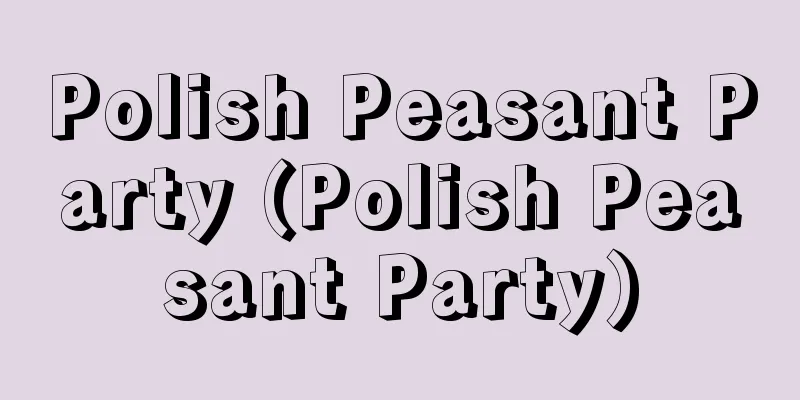Polish Peasant Party (Polish Peasant Party)

|
Abbreviation: PSL. A Polish political party. One of the oldest traditional peasant parties in the world. Originally formed by the merger of several political organizations, its name has changed several times. The peasant political movement in Poland was formed earliest in the Austrian territories, where rural poverty and political freedom were in stark contrast. The Peasant Party (SL) was established as early as 1895, and in 1903 it was renamed the Polish Peasant Party (PSL). Initially, it was more of a vote-gathering organization for the Vienna parliament, and did not have a clear platform other than criticizing economic backwardness and demanding democratization of the political system. However, since 2003 it has demanded universal suffrage, universal education, subsidies for farmers, and autonomy for Galicia, and has criticized the Catholic Church and conservative landowners, and won a landslide victory in the 2007 election. However, internal conflicts intensified between 2011 and 2013, leading to the party's split. The moderate faction, including W. Witos and J. Dompski, called themselves the Piast faction of the PSL in 1914, and after independence developed into a national party. They advocated moderate land reform, sent representatives to successive governments from 1918 to 1926, and served as prime minister three times. Meanwhile, the left faction, including J. Stapinski, formed the PSL Liberation faction in 1915, supported the independence struggle, especially the activities of J. Piłsudski, and called for radical land reform. After independence, together with the Polish Socialist Party, they formed the left wing of the parliament. In the 1920s, the peasant parties repeatedly split up and reunited, but in 1931 they formed the Peasant Party (SL), which became the largest opposition party, and in 1935 adopted a radical platform that included free distribution of land, socialization of large corporations, and cooperativeization of businesses. During World War II, they sent representatives to the government in exile in London and participated in the resistance movement. After the war, they split into the PSL led by former prime minister of the government in exile S. Mikolajczyk and the pro-communist SL. The PSL once attracted many supporters, but was weakened by the oppression of the pro-communist government, and was absorbed into the SL in 1949 to become the United Peasant Party (ZSL), which has since played a de facto role as an auxiliary of the Polish United Workers' Party. However, in December 1989, the PSL regained its former name of the Peasant Party under the full-fledged multi-party system that began after the parliament passed a resolution to delete the constitutional clause that stipulated the leading role of the United Workers' Party. In the 1991 election, the PSL fought as the core of the Peasant Union and won 48 seats. In the 1993 election, it made a big leap to 132 seats on its own, and formed a coalition cabinet with the Democratic Left Alliance and a cabinet headed by Waldemar Pavlac. However, in the September 1997 general election, the PSL lost 27 seats, a crushing defeat of more than 100 seats. Source: Encyclopaedia Britannica Concise Encyclopedia About Encyclopaedia Britannica Concise Encyclopedia Information |
|
略称 PSL。ポーランドの政党。世界で最も古い伝統をもつ農民政党の1つ。本来いくつかの政治組織が合流してできたもので,名称も何度か変っている。ポーランドにおける農民の政治運動は農村の貧困と政治的自由が著しい対照をなしていたオーストリア領で最も早く形成され,早くも 1895年に農民党 SLが成立,1903年にポーランド農民党 PSLと改称した。当初はウィーン議会への選挙のための集票組織という性格が強く,経済的後進性の批判と政治制度の民主化要求のほか特に明確な綱領をもたなかったが,03年以降普通選挙,普通教育,農民補助,ガリチア自治を要求し,カトリック教会,地主保守派を批判するにいたり,07年の選挙で大勝。しかし 11~13年に内紛が激化し,分裂。 W.ウィトス,J.ドンプスキら穏健派は,14年 PSLピアスト派と名のり,独立後全国政党として発展,穏健な農地改革を掲げて 18~26年の歴代政府に代表を送り,3度首班を担当した。一方,J.スタピンスキら左派は,15年 PSL解放派を結成し,独立闘争,特に J.ピウスツキの活動を支持し,急進的な農地改革の要求を掲げ,独立後ポーランド社会党とともに議会内左派を形成した。 1920年代に農民諸党は離合集散を繰返したが,31年農民党 SLを結成,最大野党となり,35年土地の無償分配,大企業の社会化,商業の共同組合化などを含む急進的な綱領を採択した。第2次世界大戦中ロンドン亡命政府に代表を送り,抵抗運動に参加。戦後元亡命政府首相 S.ミコワイチクに率いられる PSLと容共派の SLに分裂。 PSLは一時多くの支持者を集めたが,親共政権の弾圧を受けて弱体化し,49年 SLに吸収されて統一農民党 ZSLとなり,以後事実上ポーランド統一労働者党の補助機関の役割を果してきた。しかし 89年 12月,統一労働者党の指導的役割を規定した憲法条文の削除を国会で可決したことを受けて始った本格的複数政党制のもと,党名を旧称の農民党に復した。 91年選挙では農民連合の核として戦い 48議席を獲得。 93年選挙では単独で 132議席へと飛躍し,民主左翼同盟と連立内閣を組み,PSL党首のワルデマル・パブラクを首班とする内閣を組織した。しかし 97年9月総選挙では 27議席と 100議席以上を失う惨敗となった。
出典 ブリタニカ国際大百科事典 小項目事典ブリタニカ国際大百科事典 小項目事典について 情報 |
>>: Polish United Workers' Party (Poland United Workers' Party)
Recommend
run-of-mine coal
…Coal as mined (run-of-mine coal, raw coal) is ge...
Bito Jishu
A Confucian scholar of the late Edo period. His g...
Quail beans - Quail beans
...It is widely used as a staple food in Central ...
Kansei-in Temple
...The Yamanashi National Medical University is l...
Stool - Chess
A type of seat. (1) In ancient times, the furnitu...
demokracji szlachecka (English notation) demokracjiszlachecka
…[Miyajima Naoki]. … *Some of the terminology exp...
Shinkichi Takahashi
Poet. Born in Ehime Prefecture. Dropped out of Ya...
Same name Sou - Doumyouso
A united organization of warriors with the same su...
Construction paper - Mozoushi
A high-quality paper for printing, writing, offic...
Joint declaration
A declaration of policy made between the official...
Financial statement supplementary statement
It is a document that contains details about each ...
Tinnevelly senna (English spelling) Tinnevellysenna
...The legume is flattened, rectangular with roun...
Polysaccharide - English spelling: polysaccharide
A general term for carbohydrates formed by dehydr...
Senzuka Iwahashi
Iwahashi, Wakayama City is a large group of appro...
Shoka Famine
A nationwide famine lasted for several years after...

![Tokuyama [city] - Tokuyama](/upload/images/67cc56132bc8d.webp)







